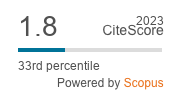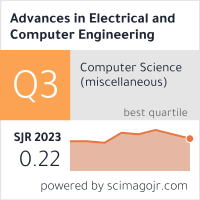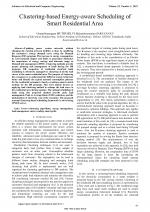| 1/2022 - 11 | View TOC | « Previous Article | Next Article » |
Clustering-based Energy-aware Scheduling of Smart Residential AreaMUTHUSELVI, G. |
| Extra paper information in |
| Click to see author's profile in |
| Download PDF |
Author keywords
clustering algorithms, energy management, load management, meter reading, smart grids
References keywords
energy(18), smart(15), residential(15), demand(13), response(10), load(10), grid(10), clustering(7), data(6), analysis(5)
Blue keywords are present in both the references section and the paper title.
About this article
Date of Publication: 2022-02-28
Volume 22, Issue 1, Year 2022, On page(s): 95 - 102
ISSN: 1582-7445, e-ISSN: 1844-7600
Digital Object Identifier: 10.4316/AECE.2022.01011
Web of Science Accession Number: 000762769600010
SCOPUS ID: 85126765661
Abstract
Updating power system networks without changing the existing network facilities is done by modifying the consumer's energy demand curve using the Demand Response (DR) program. The increase in energy consumption, its environmental impact and limits in generation illustrates the importance of energy savings and alternate usage as Demand side management (DSM). Clustering methods provide proper planning and management of loads during the DR program. DR congestion of residential electrical loads scheduling is effectively managed by clustering of all the load curves in the smart residential area. The purpose of clustering the consumers is to understand the different energy behaviour better and identify the typical seasonal consumption patterns for the residential consumers, thereby creating a smart control strategy for the DR program. This work mainly focuses on applying load clustering method to reshape the load curve in the residential area during summer. The optimal scheduling of loads using this proposed method provide peak load management, Peak to Average Ratio (PAR) reduction, and the minimization of electricity cost of the consumer. The proposed seasonal clustering-based scheduling framework is solved using CPLEX solver. |
| References | | | Cited By |
Web of Science® Times Cited: 0
View record in Web of Science® [View]
View Related Records® [View]
Updated 5 days, 21 hours ago
SCOPUS® Times Cited: 0
View record in SCOPUS® [Free preview]
There are no citing papers in the CrossRef Cited-by Linking system.
Disclaimer: All information displayed above was retrieved by using remote connections to respective databases. For the best user experience, we update all data by using background processes, and use caches in order to reduce the load on the servers we retrieve the information from. As we have no control on the availability of the database servers and sometimes the Internet connectivity may be affected, we do not guarantee the information is correct or complete. For the most accurate data, please always consult the database sites directly. Some external links require authentication or an institutional subscription.
Web of Science® is a registered trademark of Clarivate Analytics, Scopus® is a registered trademark of Elsevier B.V., other product names, company names, brand names, trademarks and logos are the property of their respective owners.
Faculty of Electrical Engineering and Computer Science
Stefan cel Mare University of Suceava, Romania
All rights reserved: Advances in Electrical and Computer Engineering is a registered trademark of the Stefan cel Mare University of Suceava. No part of this publication may be reproduced, stored in a retrieval system, photocopied, recorded or archived, without the written permission from the Editor. When authors submit their papers for publication, they agree that the copyright for their article be transferred to the Faculty of Electrical Engineering and Computer Science, Stefan cel Mare University of Suceava, Romania, if and only if the articles are accepted for publication. The copyright covers the exclusive rights to reproduce and distribute the article, including reprints and translations.
Permission for other use: The copyright owner's consent does not extend to copying for general distribution, for promotion, for creating new works, or for resale. Specific written permission must be obtained from the Editor for such copying. Direct linking to files hosted on this website is strictly prohibited.
Disclaimer: Whilst every effort is made by the publishers and editorial board to see that no inaccurate or misleading data, opinions or statements appear in this journal, they wish to make it clear that all information and opinions formulated in the articles, as well as linguistic accuracy, are the sole responsibility of the author.



